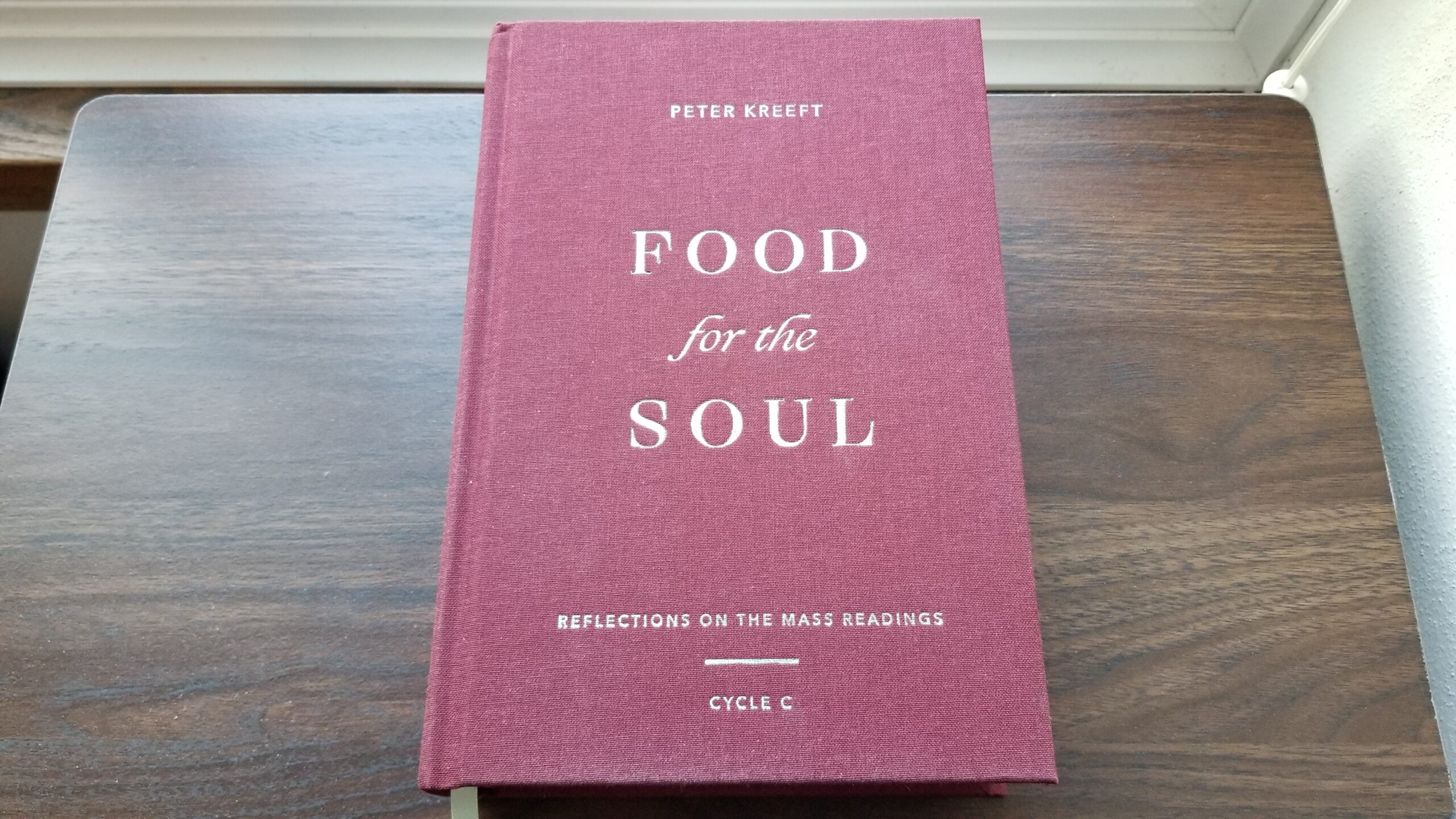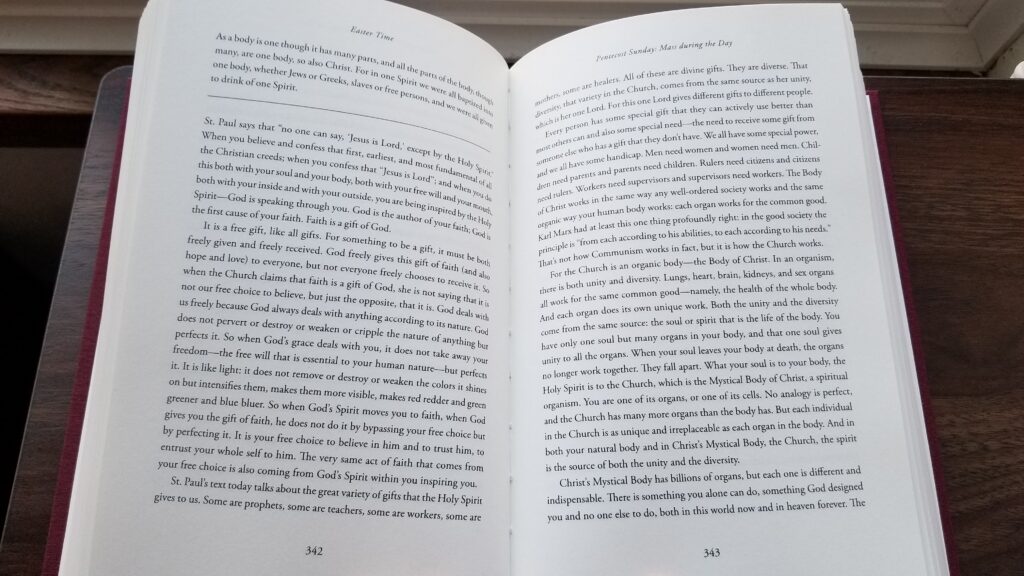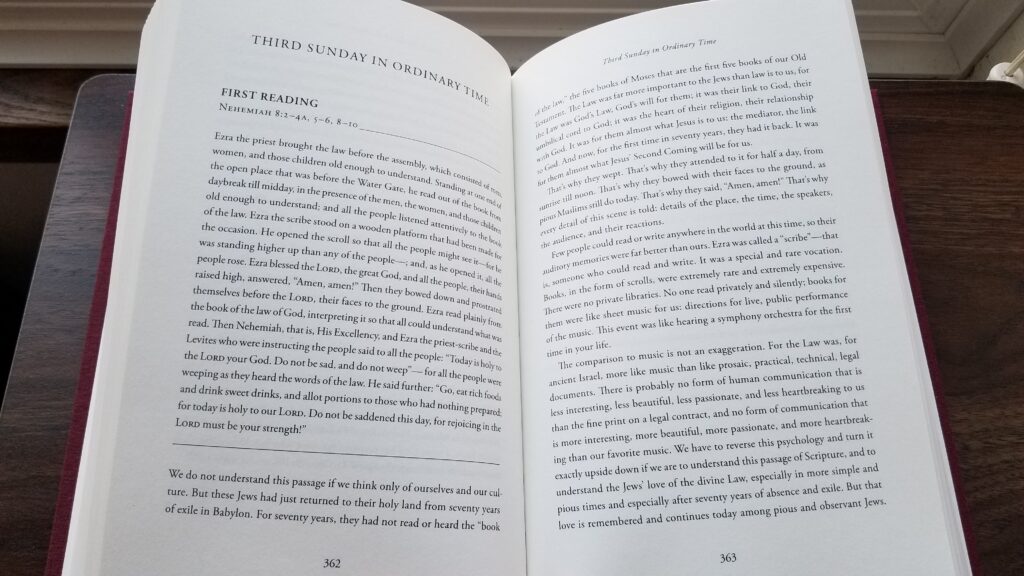
A few weeks ago, I received a review copy of a newly published book by Word on Fire: Food for the Soul: Reflections on the Mass Readings by Peter Kreeft. The book includes reflections on each of the three lectionary readings for Sunday Mass during lectionary cycle C (the current liturgical reading cycle). I’ve read the reflections for the first few Sundays in Advent, and I’ll share my impressions here.
The Author and his Purpose
Peter Kreeft is a well-known author of books for a popular Catholic audience. His previous books include the Handbook of Catholic Apologetics (coauthored with Fr. Ronald Tacelli S.J.) and A Summa of the Summa — an introduction to St. Thomas Aquinas’ Summa Theologiae. He has been a professor of philosophy at Boston College since 1965.
His approach in Food for the Soul is geared toward a popular, non-technical audience. In the introduction, he identifies three main groups he is writing for: enterprising priests, who want a “homily helper” with additional insights to enhance their homilies, “lazy priests who want to use my poor brains instead of theirs,” and “laity who are hungry for more of ‘the bread of life.'”
The introduction also includes an interesting reflection on the purpose of a homily, arguing that good homilies must always be subservient to the readings for the current Mass. He contrasts this with traditional sermons in protestant churches, which tend to focus on doctrine and select scripture to support the doctrinal topic at hand.
After a thought-provoking passage on the importance of Sacred Scripture for Catholics and the shortcomings of many modern Catholic homilies, Kreeft ends his introduction by encouraging readers to take whatever is worthwhile from his words: “Use them, choose them, and lose them as you will. Some will ‘work’ better, some worse. My words as well as my ideas are given to you for God’s glory, not mine or yours.” I think this is a wise point for any book of reflections. As I’ve read the reflections for the first few Sundays of Advent, I find myself agreeing with some more than others. But Kreeft has offered a lot of thought-provoking material here to help readers engage with the Sunday readings — a very useful goal.
Reading the Reflections
The book layout is simple and easy to use. The table of contents is uncluttered and easy to navigate, and the header of each page is labeled with the Sunday or season. For example, reflections for Pentecost Sunday have a header reading “Pentecost Sunday: Mass during the Day” on one side and “Easter Time” on the other:
For each Sunday reading, the lectionary text is printed, followed by Kreeft’s reflection on that individual reading. Each reflection averages a few pages in length (1-4 pages generally). The reflections cover a wide range of topics that are geared toward a popular church-going audience. Here’s an example of the diversity of topics:
For the Second Sunday of Advent, Kreeft’s reflection on the first reading (Baruch 5:1-9) focuses on God’s glory and the unexpected revelation of his glory in his suffering and death on the cross. He argues forcefully that the cross is more glorious than the resurrection, because it is the highest expression of God’s self-giving love.
For the second reading on the same Sunday (Philippians 1:4-6, 8-11), Kreeft reflects on the pain of children who fall away from the faith and urges parents to trust and hope in God’s persistence in pursuing his lost sheep.
The reflections are peppered with examples from modern life and popular sayings. Here are a few examples:
“…growing up in the soul is the most important meaning of progress, not the growing of our technology or of our income or of our Facebook image.”
“Does that sound preachy and fairy tale-ish? Well, if that’s not true, then the whole Christian religion is the world’s biggest fake.”
“Don’t get all As in your subjects but flunk life. Study for your final exam: read the Bible.”
“Jesus gave the devil what Southerners call a ‘whuppin'”
Kreeft is also fond of word plays. To my mind, as someone who is drawn to more heavily academic writing, these passages strike me as “cheap” or unserious, but it’s worth noting that the biblical writers also engaged in word plays and saw deeper meaning in similar words and ideas. Here’s one example that stood out when I was reading Kreeft’s reflection on Baruch for the Second Sunday of Advent:
“Great glory, like great sorrow, makes us weep, helplessly. […] Glory is a gift from heaven, like rain; that’s why it makes our faces wet with tears.”
Overall, this book is very approachable. It’s almost a surprise given the serious, high-quality, classic-style hardcover binding. The exterior style looks like a stereotypical serious and academic work, maybe a book that was published 50 or 100 years ago. But the interior content is very popular. Some popular references will probably not stay current 50-100 years from now. One could readily ask: should this book have been a paperback? Now that I’ve mentioned the binding, a few additional details are in order:
Physical Construction
Word on Fire has been committed to publishing high-quality books in the last few years. This reflects Bishop Robert Barron’s belief in the value of beauty for faith and evangelization. The Word on Fire Gospels was one of the highest production quality Bibles for a Catholic audience in recent years. Peter Kreeft’s Food for the Soul follows in the tradition of high-quality, classic-style books from Word on Fire. It is a cloth-bound hardcover (with no dust jacket) with a sewn binding, high-quality paper, and a ribbon marker.
The font and typesetting are fantastic. It is a joy to sit down and read this book. There are no compromises here to cram text onto the page or settle for thin paper. The typesetting here is like a well-designed novel or like David Bentley Hart’s translation of the New Testament. It is exceptionally good.
Word on Fire offers a PDF sample of the introduction and all four Sundays in Advent here. The book is currently on sale for 20% off at the Word on Fire store. The sale price is $27.96 (normal MSRP is $34.95).



I may pick this one up. This would be especially good for those of us who are subjected to poor sermons every week.
I totally agree. Especially true when the homilist replaces the “agenda of the readings” with his personal agenda. Quoting from above I like:
“The introduction also includes an interesting reflection on the purpose of a homily, arguing that good homilies must always be subservient to the readings for the current Mass. He contrasts this with traditional sermons in protestant churches, which tend to focus on doctrine and select scripture to support the doctrinal topic at hand.”
John Bergsma has also published reflections for Mass readings. Many of them can be viewed on https://thesacredpage.com/
Good and thorough review.
I received this as a gift a couple of days ago. It is beautiful. It’s thick and solid, but I easily brought it to Mass this evening. The reflections are classic Kreeft. I’m looking forward to journeying with Dr. Kreeft’s insights on the readings this year.
I keep thinking about this book, and I think I’m going to probably pick it up soon. I’m curious if Dr. Kreeft has plans to do additional books on cycles A and B for the other liturgical years.
I reached out to Word on Fire to ask about this, and I can confirm that Dr. Kreeft has already written reflections for cycles A and B, and Word on Fire will be publishing them one-at-a-time over the next two years.
I guess it was a fair assumption for me to make. In that case, ordering it will be a definite now. Maybe I can bundle it in with the WOF Bible Vol. 2.
I have always enjoyed Kreeft’s work and am a follower of Word on Fire, too. As a Permanent Deacon, I was eager to add this to my collection of sources for good homily ideas and have not been disappointed. I find his simple language and ‘popular’ approach a very good way to connect with my parish goers. I am an academic and scholar, who left to my own devices will often end up delivering a (boring) scholarly lecture rather than breaking open the Word for my parishioners. While I have made use of some of his thoughts, I always give him credit. I hope he continues producing the other cycles!
Cycle B has now become available, meaning the full set is now complete.